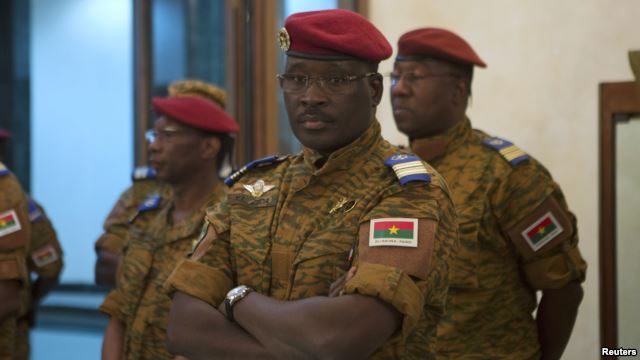File – Burkina Faso PM Yacouba Isaac Zida listens as an official reads the names of transitional government ministers in Ouagadougou, November 2014.
With about four months to go before elections, observers say Burkina Faso’s transitional government must focus on organizing the ballot and promoting a peaceful climate.
But recent tensions between Prime Minister Yacouba Izaac Zida and the RSP, the presidential security regiment, have put the country and political observers on alert.
Existing risks
Cynthia Ohayon, West Africa analyst for the International Crisis Group, told VOA from Ouagadougou, that there are risks that should be acknowledged and mitigated as quickly as possible.
“This tension between the government and RSP could actually threaten the stability of the country,” she said. “It has created a mini-crisis in the past especially in February and December last year,.”
Zida had threatened to disband the regiment that both he and former president Compaore once belonged to. But the prime minister has since changed his tone and said the group is important to security.
Recently, gunshots were heard fired into the air from inside the camp of the RSP, allegedly to protest the questioning of two RSP leaders about rumors of attempts to arrest the prime minister.
Marcel Tankoano, president of M21, a civil society organization that helped to topple President Compaore, said there is something “bnormal” in the relationship between the RSP and Zida.
“What are they [the RSP] complaining about? We don’t understand,” he said. “Zida is the PM and having issues with the RSP only distracts him while running the government. And with the elections being only three months away, we won’t be able to go to the ballot with these kinds of trouble.”
Considering the regiment
Aziz Sana, member of parliament from Burkina Faso’s National Transitional Council, said the general feeling on keeping or disbanding the RSP is mixed. But he said something needs to be done about the regiment.
“All we asked for during the transition was to reform that military body and the next president can take it from there,” said Sana.
Beside these tensions, Ohayon said there are other risks regarding the new electoral code, which says those who supported President Compaore’s bid to amend the constitution cannot run for office in the next election.
“If the electoral code creates a lot of controversies and if there’s a lot of appeal against it, there is also risk that this could delay the electoral process,” she said. “And if there’s a gap, some actors might want to take advantage, or the ones that are in power now could also take advantage of the gap and stay in power.”
Burkina Faso’s transitional President Michel Kafando released a statement this week calling for calm. He said he’s committed to free and transparent elections, refuting claims that his government wants to prolong the current transition.
FRENCH VERSION



